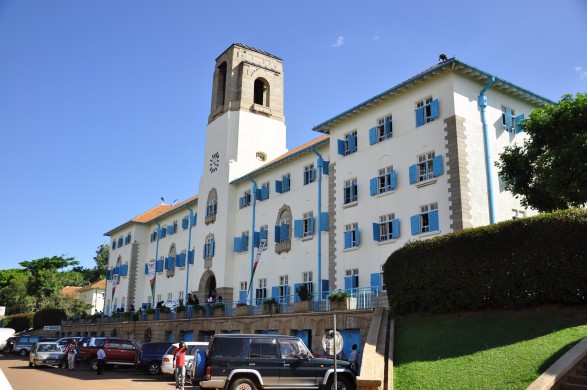The Academic Registrar, Makerere University invites applications from Ugandan, East African, S. Sudan and International applicants for the undergraduate programmes under the private sponsorship scheme for the 2015/2016 Academic Year. The details are as follows:
Each applicant should:
EITHER
(a) Have the Uganda Certificate of Education (UCE) with at least five passes, or its equivalent and at least two principal passes at Advanced Level (UACE) obtained at the same sitting. (for day programmes, only candidates who sat A' Level in 2014, 2013 and 2012 are eligible to apply. For Evening, Afternoon, and External programmes, a candidate is not restricted on the year of sitting A'Level. (Detailed weighting system for programmes offered at Makerere University for the 2015/2016 academic year can be viewed on the undergraduate Admissions Office notice board or Makerere University website. www.mak.ac.ug)
OR
(b) Hold at least a Second Class or Credit (or equivalent classification) Diploma from a recognised institution, relevant to the programmes applied for. Certified copies of academic transcripts (not photocopies of certified copies) from the awarding Institutions MUST be attached to the application forms. (Details of the Diploma holders' admission requirements for the 2015/2016 academic year can be viewed on the Notice Board of the Undergraduate Admissions Office or on Makerere University Website: www.mak.ac.ug).
OR
(c) Be a graduate from a recognised university. Certified copies of academic transcripts (not photocopies of certified copies) from the awarding Institutions MUST be attached to the application forms.
How to Apply
(i) Application Forms and other relevant information may be obtained from Undergraduate Admissions Office, Level 3, Senate Building, Makerere University, or can be downloaded from our website www.mak.ac.ug with effect from Monday 4th May, 2015.
(iii) All applicants for Bachelor of Laws (LAW & LAE) MUST have sat and passed the Pre-Entry Examinations set by Makerere University.
(iv) A non-refundable application fee of Shs.50,000/= for UGANDANS, EAST AFRICAN AND S. SUDAN OR Shs.172,500/= for International Applicants plus bank charge of shs.2,500/= should be paid from the following banks using Makerere University paying-in-slips:
BANK ACCOUNT NAME ACCOUNT NUMBER
ANY STANBIC BANK BRANCH MUC – FEES COLLECTION ACCOUNT 9030005816385
DFCU BANK MAKERERE BRANCH MUC – FEES COLLECTION ACCOUNT 01013500181512
CENTENARY BANK MUC – FEES COLLECTION ACCOUNT 4912300001
CRANE BANK MUC – FEES COLLECTION ACCOUNT 0145053500100
(iii) After paying, each applicant must attach a copy of the paying – in slip to the application form and submit the completed application form to the Undergraduate Admissions Office in the Senate Building, Makerere University.
Candidates who hold grades x, y, z, 7 and 9 of 'O' LEVEL results should not apply because they are Not eligible for admission.
Diploma holder applicants who hold class three (3) Diploma Certificates are not eligible for admission and therefore should not apply, except where stated in the Diploma holders requirements.
INSTRUCTIONS FOR ON-LINE APPLICATION
On-Line Application is for the Applicants who sat for the Uganda Advanced Level Certificate (UACE) only. The website address and instructions are shown below.
The Website is http://application.mak.ac.ug/eisweb/
After accessing the website, click on the Academic year 2015/2016. It will display a form with five pages.
Page 1 has the “Biographical “ data
Here you fill in all your Biographical information and no field should be left blank. Thereafter proceed to the next page by clicking on “next” below the page
Page 2 has the “Programme Applications”
This is where you filll in all your six choices. There is a "search" provided, to enable you search for the academic programmes you want to apply for (Make sure you choose the correct codes)
Page 3 has the “Subject Combinations”
On this page, please select the subject combinations you would wish to take for programmes like those in Education, Sciences and Humanities.
Page 4 has the “Uganda Advanced Certificate”
Select the “Centre Number “of A-level School, enter your “Index No” and the “Year of Exam" of the A- Level sitting. Your A-Level results will be displayed below. Then select the subjects under "Subject" and the corresponding grades under “Grade”
Page 5 has the “Uganda Certificate of Education”
Select the "Centre Number" of O-level School, enter your "Index No." and the "Year of Exam" of the O-Level sitting. Your O-Level results will be displayed below. Then select the subjects under "Subject" and the corresponding grades under "Grade'.
The Last step is “Save Application”. A “ten digit number” will be generated that you will fill in on the Bank Slips provided by the banks. (Please print that slip generated for future reference)
Pay a non-refundable application fee of Fifty Thousand shillings (50,000 UGX) for Ugandans, East African and South Sudan or One hundred seventy two thousand five hundred shillings (172,500 UGX) for International applicants excluding bank charges. The closing date for submitting the completed Application Forms or On-Line applications will be Friday 29th May, 2015.
WARNING:
Applicants are strongly warned against presenting forged or other people's academic documents to support their applications for admission. The consequences, if discovered, are very grave indeed.
ALFRED MASIKYE NAMOAH
ACADEMIC REGISTRAR
DATE: 30th April, 2015


 General18 hours ago
General18 hours ago
 General17 hours ago
General17 hours ago
 Humanities & Social Sciences2 weeks ago
Humanities & Social Sciences2 weeks ago
 General1 week ago
General1 week ago
 Agriculture & Environment2 weeks ago
Agriculture & Environment2 weeks ago


